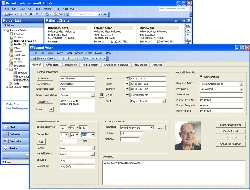- Law makers are just beginning to realize the problem the medical community has in sharing data between systems.
 Five years ago I wrote a column regarding patient records in medicine, "My Dinner with the Doctor." At the time, the government mandated that all doctors and medical institutions were required to process all patient records electronically. This created an uproar in the medical community in that doctors and nurses were forced to expend an inordinate amount of time creating and updating records. As a result, doctors were spending more time updating records as opposed to caring for their patients; Nurses were also swamped by records, leaving it to orderlies to look after patients. In other words, they were spending more time on bureaucratic red tape as opposed to caring for the sick.
Five years ago I wrote a column regarding patient records in medicine, "My Dinner with the Doctor." At the time, the government mandated that all doctors and medical institutions were required to process all patient records electronically. This created an uproar in the medical community in that doctors and nurses were forced to expend an inordinate amount of time creating and updating records. As a result, doctors were spending more time updating records as opposed to caring for their patients; Nurses were also swamped by records, leaving it to orderlies to look after patients. In other words, they were spending more time on bureaucratic red tape as opposed to caring for the sick.
There is certainly nothing wrong with the concept of electronic patient records, but the government didn't think this through carefully and provided no standards for the data to be captured, and how to exchange it with other systems. Consequently, a plethora of software packages popped up to record and manage medical records. Graphically, they all looked nice, but they did not work cooperatively (aka "Closed Systems").
It has long been a Bryce's Law that, "The only way that information systems communicate, both internally and externally to other systems, is through data." In this day and age of computing, it is difficult to imagine a software product without some form of import/export facility, be it nothing more than "Save as" (another file format), or through use of the clipboard. Instead, most of these software products have their own proprietary file formats, thereby prohibiting the exchange of data and forcing a dependency on the product.
Recently, a report was brought to my attention from "MedicalMedicine," one of a group of medical publications offered by UBM Advanstar. In the report, a fellow at the Brookings Institution Center for Technology Innovation, had a recent epiphany whereby vendors have taken patient data "hostage," meaning they prohibit interoperability. All I can say is, "No fooling!"
The report goes on to say the marketplace is now saturated, and the only way to make money is in data migration. For example, if a doctor wants to move from one package to another (which is quite common), it's not simply a matter of exporting the data from the old package and importing it into the new package. Instead, he must pay a fee for someone to reconfigure the file format, thereby permitting its use in the new package. At the end of the article, readers added their comments which is where I discovered doctors were paying such fees as $3,500, $6,500, and as much as $12,000 to migrate their data. Again, had the government thought about this properly, there would be an import/export facility and standard file formats (such as Delimited ASCII or fixed length records), and this data migration ripoff would have been avoided and costs cut.
What is frustrating is this problem of data interoperability is just coming to light. The medical community has known about it for years, but the government had no clue about it. This is an instance of automating for the sake of automating, without any consideration for data exchange. The true purpose of patient electronic records is to allow the easy exchange of medical data. For example, if I were to happen to have a medical emergency in a distant town, such as Cincinnati, my records could easily be transmitted electronically by my Palm Harbor physician. However, this is not how it works. Because of the lack of standards by the government, my doctor would have to FAX my medical records instead, a much slower process.
What is happening in medical records management is simply barbaric. There is no other way to describe it. As a systems consultant, I just shake my head in disbelief. As Stengel would have observed, "Whodathunkit!"
Keep the Faith!
Note: All trademarks both marked and unmarked belong to their respective companies.
 Tim Bryce is a writer and the Managing Director of M&JB Investment Company (M&JB) of Palm Harbor, Florida and has over 30 years of experience in the management consulting field. He can be reached at timb001@phmainstreet.com
Tim Bryce is a writer and the Managing Director of M&JB Investment Company (M&JB) of Palm Harbor, Florida and has over 30 years of experience in the management consulting field. He can be reached at timb001@phmainstreet.com
For Tim's columns, see:
timbryce.com
Like the article? TELL A FRIEND.
Copyright © 2015 by Tim Bryce. All rights reserved.
NEXT UP: WARNING TO BLOGGERS: BEWARE OF YOUR COPYRIGHTS - Before you start blogging, protect yourself.
LAST TIME: THE SIMPLE PLEASURE OF FRIDAY MORNINGS- Rise and shine, and see what is going on in the world.
Listen to Tim on WJTN-AM (News Talk 1240) "The Town Square" with host John Siggins (Mon, Wed, Fri, 12:30-3:00pm Eastern); WZIG-FM (104.1) in Palm Harbor,FL; and KIT-AM 1280 in Yakima, Washington "The Morning News" with hosts Dave Ettl & Lance Tormey (weekdays. 6:00-9:00am Pacific). Or tune-in to Tim's channel on YouTube.
No comments:
Post a Comment